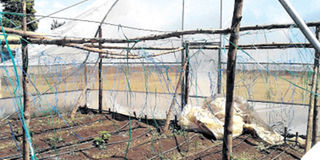Winds blow away tomato farming dream

An abandoned greenhouse at Kithoka Primary School in Meru. PHOTO | KENNEDY KIMANTHI | NATION MEDIA GROUP
What you need to know:
- The Sh180,000 greenhouse was handed over to the school on November 14 last year by a sponsor who expected a monthly progress report.
- Marangu said he has sought the assistance of the sponsor who provided the kit to help rebuild it because the school administration cannot afford.
- Amiran Coast region agronomist Melly Mark said the group received training that was useful in supporting them to start making money.
Kithoka Primary School in the semi-arid North Imenti, Meru County invested in a greenhouse last year.
Head teacher Rogerson Marangu told Seeds of Gold that they harvested about 500kg of tomatoes from the 40 by 16m structure fetching close to Sh10,000 in December last year.
After the harvest, the crop was soon infected by the contagious bacterial wilt disease at the flowering stage.
“An extension officer informed us that the disease was infectious and our crops had little chances of survival. And true to the officer’s word, the crop wilted from the roots towards the leaves,” said Marangu.
However, he blamed what happened to their crop to lack of knowledge in greenhouse farming.
“I think as a school we were not fully aware of the responsibilities that come with greenhouse farming, including how to handle diseases.”
Supply of water to the school was also inadequate, making them water the crop irregularly.
The school further relied on a worker who had minimal knowledge on the proper management of a greenhouse and the crop.
“I have learnt that the day-to-day management of the whole project is very important. Competence and commitment is a strict requirement if the farming is to be effective,” he said adding that it’s important that qualified persons are employed to manage a greenhouse.
PROGRESS REPORT
The Sh180,000 greenhouse was handed over to the school on November 14 last year by a sponsor who expected a monthly progress report.
But the school has no good news to report as heavy winds have also destroyed the cover of the greenhouse.
The exposed drip lines have now been destroyed by the sun. The greenhouse’s seedbed has also been invaded by birds and other insects.
“The placement of the structure was done wrongly. If we are to continue with the project, we will have to relocate it so that it is not in the path of the winds.”
Marangu said he has sought the assistance of the sponsor who provided the kit to help rebuild it because the school administration cannot afford.
“We are optimistic that we will go back to tomato farming having learned our lessons. We have talked to the sponsor and they have expressed willingness to help rebuild it at the same time giving us new tomato seedlings to plant but that will happen according to their own planning and once they are satisfied we are capable of handling it.”
He advised greenhouse owners who have full-time jobs elsewhere to employ workers who are competent. Marangu further underscores the need to regularly train farmers on greenhouse management.
Away from Meru, Klavan Fundi, 30, walks in their greenhouse in Kikambala, Kilifi County, checking if his tomatoes are infested with pests.
With 11 other members of Kikambala Youth Group, they took a loan of Sh350,000 last October to invest in two greenhouses of 8 by 15m to grow tomatoes. They were to use proceeds from the greenhouse to offset the loan.
FIRST HARVEST
“We planted last November, irrigated the tomato crop and in February, we were lucky to have our first harvest that earned us Sh60,000 after selling each kilo of tomatoes at Sh100,” Fundi said.
Before they started the project, members of the group received training on tomato husbandry, book-keeping and team dynamics.
“We do our own costing and keep records of all the things we do, from scouting of pests to harvesting and selling, which is crucial in the business of the management.”
When they started, Fundi said they believed that they would make quick money from the project.
“We thought the greenhouse would be our fast escape route from joblessness but it turned out that was wishful thinking,” said Fundi, the chair.
With the Sh60,000 they made after selling the produce to a school, eateries and traders, they could not meet all their needs.
“Our planning was poor. We believed that we could service the loan and still have some money to share amongst ourselves and run the farm.”
Besides the high expectation, one of the mistakes the group members made which nearly cost them, according to Fundi, is that they failed to use safety gears when spraying pesticides on the crops.
“A member went to spray the tomatoes without wearing masks, gloves and helmet. We had to rush him to the nearby clinic for first aid after he started complaining of nausea and dizziness.”
Amiran Coast region agronomist Melly Mark said the group received training that was useful in supporting them to start making money.
“We make routine visits to the project once a month to monitor progress and assist on the challenges. We are building the capacity of the group to ensure they remain as a unit and use their farm as a training centre.”






